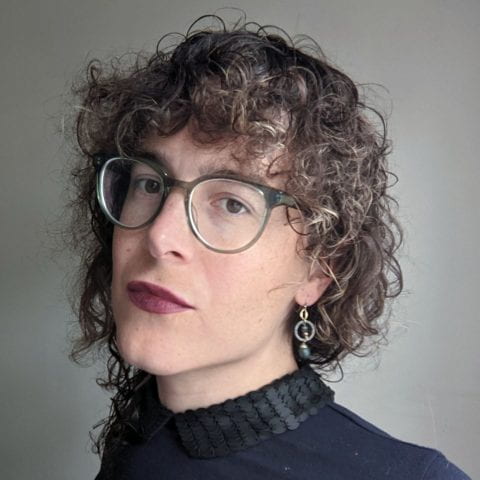Living Queer History: Remembrance and Belonging in a Southern City, A Lecture by Samantha Rosenthal

Queer history is a living practice. Talk to any group of LGBTQ people today, and they will not agree on what story should be told. Many people desire to celebrate the past by erecting plaques and painting rainbow crosswalks, but queer and trans people in the twenty-first century need more than just symbols—they need access to power, justice for marginalized people, spaces of belonging. Approaching the past through a lens of queer and trans survival and world-building transforms history itself into a tool for imagining and realizing a better future.
In her book Living Queer History, Samantha Rosenthal tells the story of an LGBTQ community in Roanoke, Virginia, a small city on the edge of Appalachia. Interweaving historical analysis, theory, and memoir, Rosenthal tells the story of their own journey—coming out and transitioning as a transgender woman—in the midst of working on a community-based history project that documented a multigenerational southern LGBTQ community. Based on over forty interviews with LGBTQ elders, Living Queer History explores how queer people today think about the past and how history lives on in the present.
 Gregory Samantha Rosenthal (she/her or they/them) is Associate Professor of History and Coordinator of the Public History Concentration at Roanoke College in Salem, Virginia. She is the author of two books, Living Queer History: Remembrance and Belonging in a Southern City (University of North Carolina Press, 2021) and Beyond Hawaiʻi: Native Labor in the Pacific World (University of California Press, 2018). They have additionally authored half a dozen journal articles and over twenty additional written works. Samantha is co-founder of the Southwest Virginia LGBTQ+ History Project, a queer public history initiative based in Roanoke, Virginia. Her work, as an author and with the History Project, has been recognized with awards and honorable mentions from the National Council on Public History, the Oral History Association, the Committee on Lesbian, Gay, Bisexual, and Transgender History, the American Society for Environmental History, and the Working Class Studies Association. She currently serves on the Governing Board of the Committee on Lesbian, Gay, Bisexual, and Transgender History, and previously served on the Board of Directors of the Salem Museum & Historical Society and the Roanoke Diversity Center. Samantha is a committed queer, feminist, and anti-racist activist and community organizer. They are particularly passionate about mentoring young queer and trans people in Southwest Virginia.
Gregory Samantha Rosenthal (she/her or they/them) is Associate Professor of History and Coordinator of the Public History Concentration at Roanoke College in Salem, Virginia. She is the author of two books, Living Queer History: Remembrance and Belonging in a Southern City (University of North Carolina Press, 2021) and Beyond Hawaiʻi: Native Labor in the Pacific World (University of California Press, 2018). They have additionally authored half a dozen journal articles and over twenty additional written works. Samantha is co-founder of the Southwest Virginia LGBTQ+ History Project, a queer public history initiative based in Roanoke, Virginia. Her work, as an author and with the History Project, has been recognized with awards and honorable mentions from the National Council on Public History, the Oral History Association, the Committee on Lesbian, Gay, Bisexual, and Transgender History, the American Society for Environmental History, and the Working Class Studies Association. She currently serves on the Governing Board of the Committee on Lesbian, Gay, Bisexual, and Transgender History, and previously served on the Board of Directors of the Salem Museum & Historical Society and the Roanoke Diversity Center. Samantha is a committed queer, feminist, and anti-racist activist and community organizer. They are particularly passionate about mentoring young queer and trans people in Southwest Virginia.

